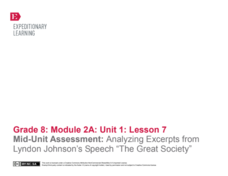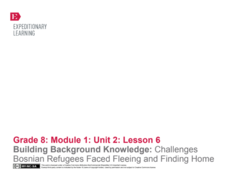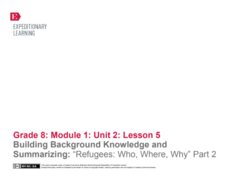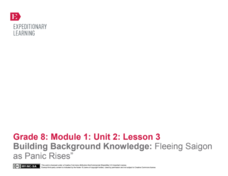EngageNY
Analyzing the Central Claim and Supporting Claims: “The Shakespeare Shakedown”
Scholars continue to analyze Simon Schama's article "The Shakespeare Shakedown." They participate in a jigsaw discussion to identify the author's argument and supporting claims. Pupils also write objective summaries of the text.
EngageNY
Building Background Knowledge: Vietnam as a “Battleground in a Larger Struggle”
Read. Stop. Think. Scholars use a reading strategy to process the challenging text, "The Vietnam Wars." They read a paragraph and then stop to think about the text and its meaning. Readers then go on to work with partners and make notes...
EngageNY
Mid-Unit Assessment: Analyzing Excerpts from Lyndon Johnson’s Speech “The Great Society”
Time for intermission! Scholars take an intermission break from learning in the unit to work on a mid-unit assessment independently. Readers answer questions about Lyndon Johnson's Speech "The Great Society" to demonstrate the knowledge...
EngageNY
World Cafe: Analyzing Sojourner Truth’s “Ain’t I a Woman?”
May I take your order? Scholars read "Ain't I a Woman" and participate in a World Cafe. They work in small groups to discuss text-related questions and then complete a Note-Catcher sheet to organize their thoughts. For homework, learners...
EngageNY
Central Idea and Supporting Details: “Equal Rights for Women”
It's my right, not a privilege! Scholars review the details of the claims in the speech "Equal Rights for Women." They meet with one of their discussion appointments from a previous instructional activity to locate evidence to support...
EngageNY
Building Background Knowledge: The Impending Fall of Saigon
Scholars read "Doc-Lap at Last" and participate in a Three Threes in a Row activity in which they answer three questions about the text in their rows. They then discuss the central idea of the text. Readers finish the lesson plan with a...
EngageNY
Building Background Knowledge: Small-Group Work to Learn More about the History of Wars in Vietnam
Scholars take a close look at "The Vietnam Wars." They answer questions and discuss in groups to conclude that the author respects the Vietnamese. They participate in a modified jigsaw discussion and end the exercise with a quick writing...
EngageNY
Building Background Knowledge: Guided Practice to Learn about the History of Wars in Vietnam
Scholars use a map of Asia to help them better understand the article "The Vietnam Wars," focusing on word meaning in the title and subtitle. Learners then use guided notes while reading the article and discuss their ideas with partners.
EngageNY
Close Reading: Paragraph 4 of “Refugee and Immigrant Children: A Comparison”
Why is reading a text closely a helpful skill? Using the 13th of 20 lessons from the Grade 8 ELA Module 1, Unit 2 series, scholars continue reading the informational text "Refugee and Immigrant Children: A Comparison." They work with...
EngageNY
Close Reading: Paragraph 1 of “Refugee and Immigrant Children: A Comparison” (from “Refugee Children in Canada: Searching for Identity”)
What common challenges do refugees and immigrants face? Using the 9th lesson plan from the 20-part Grade 8 ELA Module 1, Unit 2 series, pupils read about the similarities between refugees' and immigrants' adaptation processes. Partners...
EngageNY
Close Reading: Paragraphs 2 and 3 of “Refugee and Immigrant Children: A Comparison” and Introducing the NYS Expository Writing Rubric
What factors make adaptation successful for refugee and immigrant children? The class explores the topic by reading two paragraphs from "Refugee and Immigrant Children: A Comparison." Next, they engage in a think-pair-share to discuss...
EngageNY
Mid-Unit Assessment: Analyzing an Informational Text about a Refugee Experience
Refugee & Immigrant Transitions is an organization that helps newcomers adjust to life in the United States through education and community leadership opportunities. As part of a mid-unit assessment, pupils independently read a...
EngageNY
Building Background Knowledge: Challenges Bosnian Refugees Faced Fleeing and Finding Home
What challenges did Bosnian refugees face as they fled home during the Bosnian War? Scholars read an interview with four refugees and identify common themes that connect the universal refugee experience. They also engage in a...
EngageNY
Building Background Knowledge and Summarizing: “Refugees: Who, Where, Why” Part 2
What are some universal aspects of refugees' experiences worldwide and throughout history? Scholars read the text "Refugees: Who, Where, Why" and create two class anchor charts. Finally, they each write a paragraph that provides an...
EngageNY
Building Background Knowledge: "Fleeing Saigon as Panic Rises”
How can scholars better understand the refugee experience? Pupils read Fox Butterfield's article "Panic Rises in Saigon, but the Exits are Few" and connect it to the novel Inside Out & Back Again. They annotate the text, looking for...
Curated OER
Myth and Truth: The First Thanksgiving
Encourage learners to think critically about common myths regarding the Wampanoag Indians in Colonial America. They discover that behind every myth are many possible explanations—and that learning more about American history helps them...
PBS
Latino Americans Share Their Experiences
Three Latino Americans are the focus of an interactive that spotlights their accomplishments. Scholars get to know Lin-Manuel Miranda, Judy Reyes, and José Hernández through short informative text and videos. Participants read, take...
Ohio State University
Lesson Plan on China
Scholars ponder the beliefs of Confucianism. After reading several sayings made by Confucius, participants complete a chart filling in what each saying means using their own words. Using the same quotes split in half, pairs match...
Echoes & Reflections
Contemporary Antisemitism
Despite the recognized atrocities of the Holocaust, anti-semitism continues. The 11th and final installment of the Teaching the Holocaust series explores the long-term effects of the Holocaust on modern anti-semitism, asking pupils to...
Echoes & Reflections
Perpetrators, Collaborators, and Bystanders
After the Holocaust, the world grappled with how to bring justice to the Nazis. But what to do with the thousands—if not millions—who allowed it to happen? Young historians consider the issues of guilt, collaboration, and responsibility...
Echoes & Reflections
Antisemitism
Propaganda and anti-semitism were linked to evil ends during the Holocaust. Using video testimony of Holocaust survivors, examples of Nazi propaganda, and discussion questions, learners explore the roots of anti-semitism in Europe and...
Stanford University
Declaration of Independence
Scholars work in pairs to decide whether leaders wrote the Declaration of Independence for the rich and powerful or for every man. To draw their conclusion, pairs read excerpts from two historians and complete a graphic organizer citing...
The New York Times
Where to Draw the Line: Balancing Government Surveillance with the Fourth Amendment
The question of how to balance Fourth Amendment Rights with national security concerns becomes critical in an age of planned terrorist attacks, election interference, and fake news. Get young social scientists involved in the debate with...
Middle Tennessee State University
The Declaration of Independence: Its Legacy and Ideas in Today’s World
How is it possible that such an old document still triggers modern discussions? Teach scholars why the Declaration of Independence is still so important today using an informative resource. They watch various educational videos, work in...

























